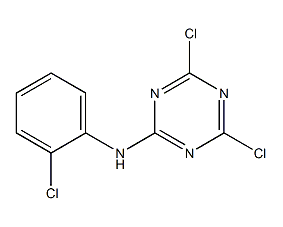Anilazine Anilazine


Structural formula
| Business number | 02K2 |
|---|---|
| Molecular formula | C9H5Cl3N4 |
| Molecular weight | 275.52 |
| label |
2,4dichloro-6-(2-chloroanilino)s-triazepine, diprofen, Diprofen wettable powder, 2,4-Dichloro-6-(2-chlorophenylamino)-1,3,5-triazine, Dailin, Dailing, antifungal, Bortrysan, Kemate, Triazin, Zinochlor, Triasym, Fungicide |
Numbering system
CAS number:101-05-3
MDL number:MFCD00041815
EINECS number:202-910-5
RTECS number:XY7175000
BRN number:223133
PubChem number:24868778
Physical property data
1. Properties: Appearance is white to yellow crystals.
2. Density (g/mL, 25℃): Undetermined
3. Relative vapor density (g/mL, air=1): Undetermined
4. Melting point (ºC): 159~160
5. Boiling point (ºC, normal pressure): Undetermined p>
6. Boiling point (ºC, 4.0KPa): Undetermined
7. Refractive index: Undetermined
8. Flash point (ºC): Undetermined
p>
9. Specific rotation (º): Undetermined
10. Autoignition point or ignition temperature (ºC): Undetermined
11. Vapor pressure (mmHg , 20ºC): Undetermined
12. Saturated vapor pressure (kPa, ºC): Undetermined
13. Heat of combustion (KJ/mol): Undetermined
14. Critical temperature (ºC): Undetermined
15. Critical pressure (KPa): Undetermined
16. Log value of oil-water (octanol/water) partition coefficient : Undetermined
17. Explosion upper limit (%, V/V): Undetermined
18. Explosion lower limit (%, V/V): Undetermined
19. Solubility: Soluble in chain hydrocarbons and most other organic solvents.
Toxicological data
The acute daily LD50 of rats is 2710mg/kg (5000mg/kg), and that of rabbits is 9460 mg/kg. Low toxicity to birds, safe to bees, highly toxic to fish.
Ecological data
None yet
Molecular structure data
1. Molar refractive index: 64.58
2. Molar volume (cm3/mol): 170.9
3. Isotonic specific volume (90.2K): 490.6
4. Surface tension (dyne/cm): 672.7
5. Dielectric constant:
6. Dipole moment (10-24cm3):
7. Polarizability: 25.60
Compute chemical data
1. Reference value for hydrophobic parameter calculation (XlogP): None
2. Number of hydrogen bond donors: 1
3. Number of hydrogen bond acceptors: 4
4. Number of rotatable chemical bonds: 2
5. Number of tautomers: 3
6. Topological molecule polar surface area 50.7
7. Number of heavy atoms: 16
8. Surface charge: 0
9. Complexity: 221
10. Number of isotope atoms: 0
11. Determine the number of atomic stereocenters: 0
12. Uncertain number of atomic stereocenters: 0
13. Determine the number of chemical bond stereocenters: 0
14. Number of uncertain chemical bond stereocenters: 0
15. Number of covalent bond units: 1
Properties and stability
Long-term contact may cause skin irritation. Animal tests have shown no carcinogenic effects.
Storage method
None yet
Synthesis method
O-chloroaniline is prepared by reduction of o-nitrochlorobenzene. For the preparation method of cyanuric chloride, see s-triazine herbicides. In the presence of an acid-binding agent, o-chloroaniline reacts with cyanuric chloride at 85°C to prepare diprofen.
Purpose
1. Mainly used to prevent and control rice blast, anthracnose, downy mildew, scab of melons, and gray mold of various crops.
2.Broad-spectrum, systemic fungicide. It is mainly used for foliar spray and has special effects on Alternaria, Cercospora, Botrytis, Botrytis and other fungi. It can prevent and control rice blast, flax leaf spot, melon anthracnose, downy mildew, scab, tobacco brown spot, tomato leaf spot and gray mold of various crops. The usage concentration is generally 400-500 times liquid spray of 50% wettable powder, and the recommended dosage is 16.8-33.6g active ingredient/100m2.
